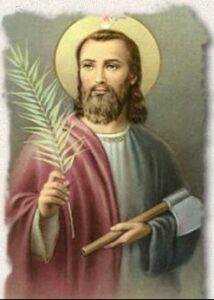JUDE (Fight for the faith and expose false teaching)
Author: Jude the fourth brother of Lord Jesus Christ.
Date: 60-65 AD.

Luke identifies this Apostle as “Judas the brother of James” who wrote this small Epistle (Luke 6:16, Acts 1:13). Jude and James were two of the four brothers of Jesus (Mark 6:3). Jude does not say that he was a brother of Jesus. He speaks of himself only as a servant of Jesus, who was now his Master. Jude was also humble enough to mention his well-known brother, James. James became a leader of the Christian church in Jerusalem (Galatians 1:19; 2:9).
Key verse:
“I urge you to contend for the faith that was once for all entrusted to the saints” (1:3b).
Author: Jude the half brother of Jesus Christ. In (Matt.13:55) the disciple refers the names of brothers of Jesus as James and Judas. English translation has shorted his name as Jude, probably for the same reason no one in the present days wants to name a child as Judas, because of the association it has with Judas Iscariot, the disciple who betrayed the Lord Jesus.
Purpose: The purpose of this letter was to expose the false teachers that had infiltrated into the Churches just as in the present days. Jude further encouraged Christians to stand firm in their faith and fight for the truth. It is important for the believers to stand against those working against the Gospel, at the same time, building each other in faith and in the love of Christ.
Jude’s life: Jude did not believe on the Lord Jesus Christ in the earlier days, like his older brother James while the Lord was still alive. After the crucifixion and resurrection of the Lord Jesus Christ, both the brothers James and Jude’s eyes were opened and both became strong followers of the Lord Jesus Christ. His power faith in Jesus made him to travel all over Roman Kingdom. He travelled from city to city with his name Judas in contrast to the betrayer Judas Iscariot reflecting his faithfulness and obedience for the Lord Jesus Christ. In (1 Cor.9:5), Paul speaks of Lord’s brothers travelling and witnessing with their wives from place to place, gives a beautiful information that Jude and James travelled all over the Roman empire with the Gospel of Jesus Christ.
The uniqueness of the book:
The book of Jude contains much information. He did not waste space beating around some issues. He condemned some of the practices of the church, rejecting authority of self pleasing personalities. He gives many pictures and images to give strong explanation for his letters.
Some of the contents of this book are found again in the letter of (2 Peter chapter-2). Perhaps Jude and Peter both must have felt the teaching of the false prophets as the greatest danger prevailing at that time. This problem is rampant even in the present day churches also.
What history says of Jude:
Hegesippus, a 2nd-century Christian writer, mentions descendants of Jude were living during the reign of Emperor Domitian (81-96 AD) under his reign the Apostle John was sent to Patmos. (Historia Ecclesiae Book III, ch. 19-20):
Emperor commanded that the descendants of David should be slain. At the same time, some heretics brought accusation against the descendants of Jude saying that Jude was the brother of Jesus. For Domitian feared the coming of Christ as Herod. So he asked them if they were descendants of David, and they confessed that they were, then he asked them how much property they had, or how much money they owned. And they answered that they had only nine thousand denari, and this property did not consist of silver, but of a piece of land which contained only thirty-nine acres, and from which they raised their taxes and supported themselves by their own labour. Then they showed their hands, exhibiting the hardness of their bodies and the callousness produced upon their hands by continuous toil as evidence of their own labour. And finally when they were asked concerning Christ and His kingdom, of what sort it was and where and when it was to appear, they answered that it was not a temporal nor an earthly kingdom, but a heavenly and angelic one, which would appear at the end of the world, He would come in glory to judge the quick and the dead, and to give unto every one according to his works.
Upon hearing this, Domitian did not pass judgment against them, but, despising them as of no account, he let them go, and by a decree put a stop to the persecution of the Church. But when they were released they ruled the churches because they were witnesses and were also relatives of the Lord. And peace being established, they lived until the time of Emperor Trajan. In fact Jude was martyred by Emperor Trajan and many of his descendants also suffered martyrdom under the Emperor Trajan.
‘Epiphanius of Salamis’ mentions a Judah Kyriakos, great grandson of Jude, was the last Jewish Bishop of Jerusalem.
Book Outline:
- Introduction and purpose: (verses 1-4)
- 6-examples of God’s judgement: (verses 5-7,11, 14-15)
- Learning from Michael (verses 8-10)
- Images of shameful leaders: (verses 12-16)
- A call to remember: (verses 17-19)
- Believer’s behaviour: (verses 20-23)
- Benediction (verses 24-25)